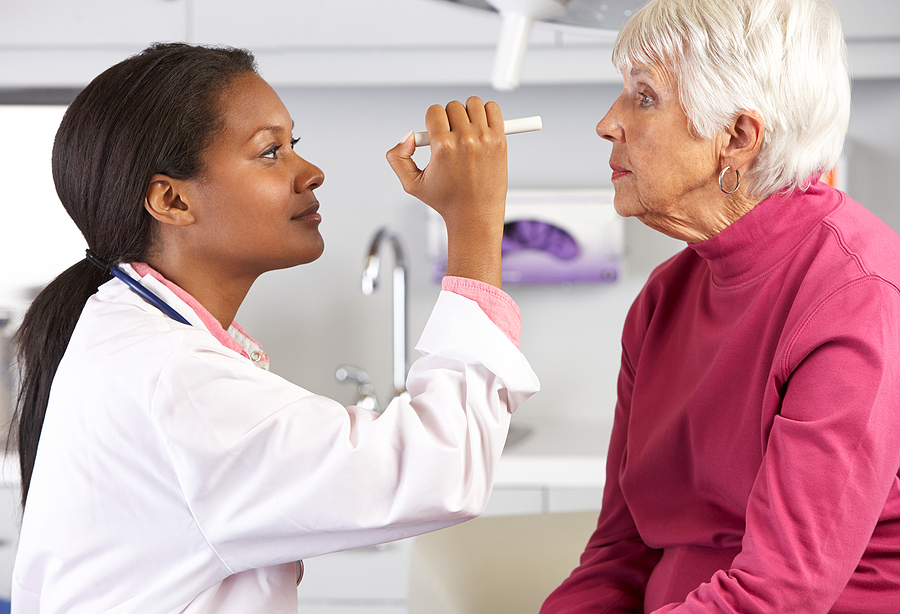
Low vision can significantly impact daily life, especially for seniors. It can make routine tasks more challenging and limit independence. With the right support, seniors living with low vision can maintain a fulfilling lifestyle and stay safe in their homes. Here are a few things to know about living with low vision and how elder care can support your senior.
What is Low Vision?
Low vision refers to a visual impairment that cannot be corrected with glasses, contact lenses, or medical treatments like surgery. It is not complete blindness, but it affects a person’s ability to perform everyday tasks such as reading, driving, or recognizing faces.
Common causes of low vision include age-related macular degeneration, glaucoma, diabetic retinopathy, and cataracts. Symptoms vary but often include:
- Blurred vision
- Difficulty seeing in low light
- Loss of central or peripheral vision
- Sensitivity to glare
- Distorted or double vision
For seniors, these changes in eyesight can be especially frustrating as they interfere with activities that help maintain independence.
What is it Like for Seniors Living with Low Vision?
Living with low vision presents unique challenges. Tasks like reading mail, preparing meals, or managing medications may take longer or become impossible without assistance. Seniors often describe feelings of frustration or loss, as the visual impairment makes them more dependent on others for help.
Social isolation is also common. Limited vision can make it harder to recognize friends or join in social activities, leading to loneliness. The inability to drive often means seniors rely on others for transportation, further limiting their independence.
Despite these challenges, many seniors adapt with the help of tools, technology, and compassionate elder care.
How Elder Care Providers Support Seniors with Low Vision
Elder care providers play an important role in helping seniors navigate life with low vision. From practical support to emotional encouragement, they make daily life more manageable and enjoyable. Here are some ways elder care providers can help:
1. Assistance with Daily Tasks
Elder care providers can assist seniors with tasks like preparing meals, organizing medications, and managing household chores. This ensures that seniors maintain their routine without the risk of accidents caused by low vision.
2. Creating a Safer Living Environment
Low vision increases the risk of falls and accidents at home. Caregivers can help make the living space safer by:
- Removing tripping hazards like loose rugs or clutter
- Installing bright lighting and motion-sensor lights
- Marking stairs and steps with contrasting tape
- Arranging furniture to provide clear, wide pathways
3. Encouraging the Use of Adaptive Tools
Many devices are designed to support those with low vision, such as magnifying glasses, large-print books, voice-activated assistants, and screen readers. Caregivers can introduce seniors to these tools and ensure they are used effectively.
4. Emotional Support and Companionship
Adjusting to life with low vision can be emotionally taxing. Elder care providers offer companionship and encouragement, helping seniors stay positive and engaged. They can also assist in connecting seniors with support groups or social activities to reduce feelings of isolation.
5. Transportation Assistance
For seniors unable to drive, elder care providers can arrange or provide transportation to appointments, errands, or social events. This allows seniors to stay active and involved in their community.
Living Well with Low Vision
While low vision poses challenges, seniors can continue to lead active and meaningful lives with the right support. Elder care ensures they remain safe, connected, and empowered to enjoy daily activities. Whether it’s through helping with tasks, creating a safer home, or simply offering a kind word, elder care providers are an invaluable resource for seniors living with low vision.
If you or an aging loved one needs elder care in Suwanee, GA, call Home Care Matters. We can answer your questions about home care and help you learn more about options for care. Call today (770) 965-4004.
Valerie has the unique experience with home care as she has experienced it from both ends of the spectrum, as a caregiver and as needing care herself as a cancer survivor. Valerie says, “Taking care of someone you love is a physically, mentally and demanding labor of love.Taking care of my mom was the hardest thing I have ever done. It has given me an insight and perspective not many people understand unless you are doing it or have done it.I loved taking care of my mom.I love helping others take care of their love ones too.And now that I’ve been sick, it’s given me a whole new level of empathy and understanding for those who are sick and need help.”
Valerie’s schedule varies daily, but she loves visiting with our clients, families, caregivers, our network partners and being in the office.Says Valerie, “Every day is different, but I wake up excited about what we do, inspired by our team, clients and caregivers.I strive to be a resource to the community.I love my team and I love what we do every day. I like to think my mom would be proud.”
You can reach Valerie by email (Valerie@homecarematters.com) or in our office (770.965.4004).
- How In-Home Alzheimer’s Care Helps Your Parent Stay Safe and Comfortable - December 26, 2025
- After the Fall: How Home Care Helps Seniors Recover Safely at Home - December 19, 2025
- Supporting Seniors with Memory Challenges Through Compassionate Senior Home Care - December 12, 2025
